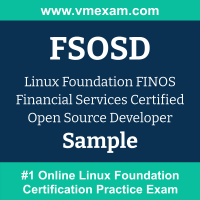 We have prepared Linux Foundation FINOS Financial Services Certified Open Source Developer (FSOSD) certification sample questions to make you aware of actual exam properties. This sample question set provides you with information about the Financial Services Open Source Developer exam pattern, question formate, a difficulty level of questions and time required to answer each question. To get familiar with FINOS Financial Services Certified Open Source Developer (FSOSD) exam, we suggest you try our Sample Linux Foundation FSOSD Certification Practice Exam in simulated Linux Foundation certification exam environment.
We have prepared Linux Foundation FINOS Financial Services Certified Open Source Developer (FSOSD) certification sample questions to make you aware of actual exam properties. This sample question set provides you with information about the Financial Services Open Source Developer exam pattern, question formate, a difficulty level of questions and time required to answer each question. To get familiar with FINOS Financial Services Certified Open Source Developer (FSOSD) exam, we suggest you try our Sample Linux Foundation FSOSD Certification Practice Exam in simulated Linux Foundation certification exam environment.
To test your knowledge and understanding of concepts with real-time scenario based Linux Foundation FSOSD questions, we strongly recommend you to prepare and practice with Premium Linux Foundation Financial Services Open Source Developer Certification Practice Exam. The premium Linux Foundation Financial Services Open Source Developer certification practice exam helps you identify topics in which you are well prepared and topics in which you may need further training to achieving great score in actual FINOS Financial Services Certified Open Source Developer (FSOSD) exam.
Linux Foundation FSOSD Sample Questions:
b) By keeping any modifications private.
b) A vibrant community indicates the software is expensive to use.
b) Avoiding responsibility for one's actions to maintain harmony in the workplace.
d) Understanding licenses is crucial for ensuring compliance and avoiding potential legal issues.
Answers:
|
Question: 01 Answer: b |
Question: 02 Answer: c |
Question: 03 Answer: b |
Question: 04 Answer: a |
Question: 05 Answer: c |
|
Question: 06 Answer: a |
Question: 07 Answer: b |
Question: 08 Answer: a |
Question: 09 Answer: d |
Question: 10 Answer: b |
Note: Please update us by writing an email on feedback@vmexam.com for any error in FINOS Financial Services Certified Open Source Developer (FSOSD) certification exam sample questions
